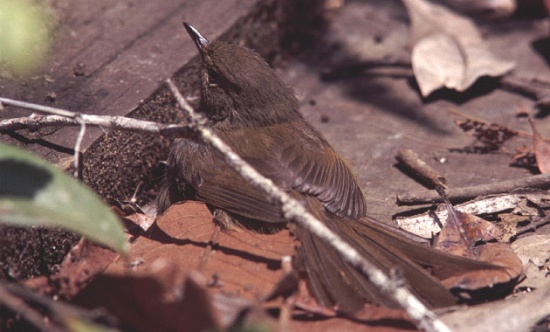Alternative names: Madagascar Brush Warbler; Madagascan Brush Warbler
- Nesillas typica
Identification
17-18 cm. A rather large warbler.
- Olive-brown plumage
- Short tail
- Long, narrow, graduated tail
- Pale buffish supercilium to just behind eye, poorly marked dusky eyestripe
- Palye yellowish-buff underparts, whiter on chin and throat, browner on flanks and undertail-coverts and with soft greyish streaks from chin to breast
- obscura is darker than nominate, less greenish above, has a greyer head and less yellowish underparts
- moheliensis is warmer brown, less olive and yellower below
Sexes alike, juveniles are uniformly brownish grey.
Distribution
Madagascar and Mohéli (Comoro Islands).
Common to abundant in its habitat.
Taxonomy
Clements treats this as conspecific with Anjouan Brush Warbler but IOC does not. The opus awaits further clarification of the situation before making changes.
Subspecies
There are 3 subspecies[1]:
- N. t. moheliensis:
- Mohéli (Comoro Islands)
- N. t. obscura:
- Northwest Madagascar
- N. t. typica:
- Central and eastern Madagascar
Habitat
Undergrowth of dense primary and degraded forest, also in secondary growth, gardens and plantations. Occurs from sea-level up to 2700 m.
Behaviour
Diet
Feeds on insects.
Forages in bushy vegetation and dense shrubbery, sometimes on the ground. Forages alone or in pairs. Forages much lower on Mohéli than Moheli Brush Warbler.
Breeding
Breeding season from August to February, mainly October to December in Madagascar. The nest is a cup made of woven dry grasses and lined with softer material. It's placed close to the ground in thick grass tuft or in a bush. Lays two eggs.
Movements
This is a sedentary species.
References
- Clements, J. F., T. S. Schulenberg, M. J. Iliff, T. A. Fredericks, J. A. Gerbracht, D. Lepage, S. M. Billerman, B. L. Sullivan, and C. L. Wood. 2022. The eBird/Clements checklist of Birds of the World: v2022. Downloaded from https://www.birds.cornell.edu/clementschecklist/download/
- Gill, F, D Donsker, and P Rasmussen (Eds). 2023. IOC World Bird List (v 13.2). Doi 10.14344/IOC.ML.13.2. http://www.worldbirdnames.org/
- Handbook of the Birds of the World Alive (retrieved May 2018)
Recommended Citation
- BirdForum Opus contributors. (2024) Malagasy Brush Warbler. In: BirdForum, the forum for wild birds and birding. Retrieved 26 April 2024 from https://www.birdforum.net/opus/Malagasy_Brush_Warbler




